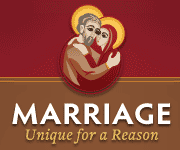our tainted nature's solitary boastand proceeded to lament the absence of Protestant recognition of her place in salvation history. Which is right, but the line comes from that lovely Protestant, Wordsworth, in a sonnet that mildly rebukes perceived (not actual) Catholic belief.
Anyway, we celebrate the prelude to the Incarnation today, and the Incarnation means God has a face. One of the loveliest passages in John Paul II's apostolic letter on the rosary is precisely about seeking God's face with Mary's aid.
In a unique way the face of the Son belongs to Mary. It was in her womb that Christ was formed, receiving from her a human resemblance which points to an even greater spiritual closeness. No one has ever devoted himself to the contemplation of the face of Christ as faithfully as Mary. The eyes of her heart already turned to him at the Annunciation, when she conceived him by the power of the Holy Spirit. In the months that followed she began to sense his presence and to picture his features. When at last she gave birth to him in Bethlehem, her eyes were able to gaze tenderly on the face of her Son, as she “wrapped him in swaddling cloths, and laid him in a manger” (Lk2:7). Thereafter Mary's gaze, ever filled with adoration and wonder, would never leave him.
No wonder then that earlier this month Benedict made a private pilgrimage to a shrine devoted to the Holy Face. Of course a papal trip is never entirely private, and he made lovely remarks about the face of Christ here, but here's a taste.
He who has seen me has seen the Father". Yes, dear brothers and sisters, to "see God" it is necessary to know Christ and to let oneself be moulded by his Spirit who guides believers "into all the truth" (cf. Jn 16: 13). Those who meet Jesus, who let themselves be attracted by him and are prepared to follow him even to the point of sacrificing their lives, personally experience, as he did on the Cross, that only the "grain of wheat" that falls into the earth and dies, bears "much fruit" (Jn 12: 24).
This is the path of Christ, the way of total love that overcomes death: he who takes it and "hates his life in this world will keep it for eternal life" (Jn 12: 25). In other words, he lives in God already on this earth, attracted and transformed by the dazzling brightness of his Face.
This is the experience of God's true friends, the saints who, in the brethren, especially the poorest and neediest, recognized and loved the Face of that God, lovingly contemplated for hours in prayer. For us they are encouraging examples to imitate; they assure us that if we follow this path, the way of love, with fidelity, we too, as the Psalmist sings, will be satisfied with God's presence (cf. Ps 17[16]: 15).
- Two audiences: August 30, about the call of Matthew, mentions my favorite Church in Rome --San Luigi Francesi --more or less halfway between Piazza Navona & the Pantheon. Wednesday's is about St. Philip. (Zenit has more satisfying translations).
- Here's an interview with the incoming Vatican Secretary of State. And Fr. Fessio describes the Pope's annual seminar with his former students (topic: creation & evolution). Curtsy to open book for those links.
- Fr. Schall has a 9/11 piece up at Insight Scoop. A novel take, I think.
To go back to the Pope, here's what he told the Canadian bishops on their recent ad limina visit.
And, as last year, he again this summer did a Q&A session with priests. The Vatican doesn't have the English up yet, but here's Spanish. I know I've seen the English somewhere, but am not finding it at present (here are excerpts). It's terrific stuff, including a passage where he reminds priests they sometimes think celibacy is the only sacrifice, but clergy could learn a lot about sacrifice from married couples. Which brings me to point out Eve Tushnet's discussion of homosexual orientation and chastity (see the 1:38 am post Aug. 29):
the effects of sin, in our hearts and in the world, are not trivial. They're deep and subtle and really hard. That's why people have had to give up things they truly loved, to follow Christ: occupations, relationships, life itself. What I've been asked to give up is not that much, compared to the sacrifices of others.
The point being in both cases, no one ever was faithful to anything by concentrating on what he was giving up and how hard/unfair it was to be asked. Feelings, while useful as information, are for the most part to be risen above rather than dwelled upon. At least if you care to be happy or accomplish anything.

